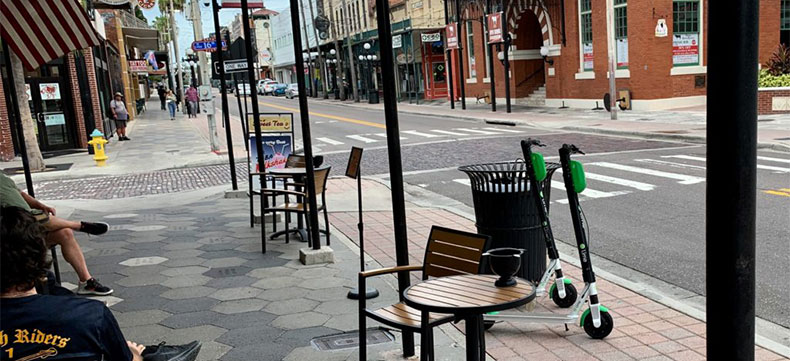
For the under-30 zealots who enjoy the free-wheeling e-scooter culture in Tampa’s urban core, it is the best of times. For seniors, the disabled, children, and strollers confined to the pedestrian experience, it has been a nightmare.
Only a few months into a one-year pilot project, scooters have caused at least one death, countless injuries, obstruction of legitimate commerce, and eyesores throughout the city as riders leave piles of the vehicles on private property, street corners, in the middle of sidewalks, and gutters.
Calvin Thornton, the city of Tampa’s pedestrian and bicycle guru, told Sunshine State News there is no real problem. Tampa cops, charged with enforcing the city’s minimal scooter regulations, ticketing scooter riders is not a priority and are willing to let violators slide.
Thornton’s answers to our questions were somewhat controversial. More on that later.

Across the bay in St. Petersburg, the city council is methodically approaching an e-scooter program by doing what Tampa city fathers neglected to do: learn from the experience of other local governments. Last year, the Tampa City Council green-lighted a one-year pilot project with virtually no research or evaluation.
St. Pete City Councilwoman Gina Driscoll said a new state law permitting e-scooters in bicycle lanes will be an enormous boon for safety. Unlike Tampa’s downtown, St. Pete has far more pedestrian traffic, particularly after sunset. When Tampa’s business day ends at 5 p.m., sidewalk usage evaporates.
Despite the relative lack of traffic in Tampa, we have witnessed near collisions with pedestrians near the Straz Performing Arts Center and Hyde Park Village.
Yet, there are legal questions over how much authority a municipality has in promulgating regulations. Thornton says Tampa cannot decree scooters off limits on sidewalks because of the pre-emption of state statutes. He gave as an example that bicycles can be legally ridden on sidewalks.
The use of scooters on the more heavily travelled sidewalks in St. Pete should be a non-starter, according to Driscoll. City attorneys are researching the issue as part of the drafting a city ordinance, Driscoll explained.
Riders cannot be required to wear safety helmets because of pre-emption. Thornton pointed out helmets are not mandatory for motorcyclists.
Tampa is not the only city in the country to retroactively regulate and enforce e-scooters but it quite possibly is the most blasé. Reportedly, 70 cities are revisiting the scooter rental business because of the many unforeseen problems.
During a visit to Ybor City a week ago, we witnessed scooters ridden and parked in restricted areas. In talking with two uniformed bicycle cops, we were told that scooter enforcement is not a priority. The duo pointed out they were the only law enforcement presence in Ybor that day.
One of the policemen volunteered that scooters have been seen on Tampa’s Riverwalk, another of the three restricted areas for scooters. (The third is Bayshore Drive).
Thornton echoes those sentiments putting full faith in scooter users conquering a learning curve before anyone dies or us seriously injured. Scooters only travel 15-20 miles per hour so any collision with a pedestrian would be mild, he said.
An elderly, visually-impaired citizen might differ with that analysis. According to the Lighthouse Of Pinellas Inc., that county has one of the highest number of visually-impaired residents per capita in the United States.
Safety is not the only issue. Riders leave scooters on private property, in the middle of sidewalks, in gutters. Somehow the clutter issue has received more media attention in Tampa than the safety problems.
A San Diego company confiscates scooters left on private property there. If the scooter firms fail to fork over a $50 payment, the vehicles are sold at auction. The company says they operate within California statutes but lawsuits are flying anyway.
Thornton, who sounded more like an apologist for the scooter rental outfits than a protector of public health and safety, declared Florida law governs towing companies and that local governments contract their services.
To hear Thornton tell it, there are virtually no permanent remedies available and no changes can be made to the pilot program during its one-year experiment. Through his eyes, the public is at the mercy of a scooter user’s learning curve and the good will of the for-profit scooter companies.
Jim Bleyer, a former reporter at the Orlando Sentinel and Tampa Tribune, writes the Tampa Bay Beat blog.


